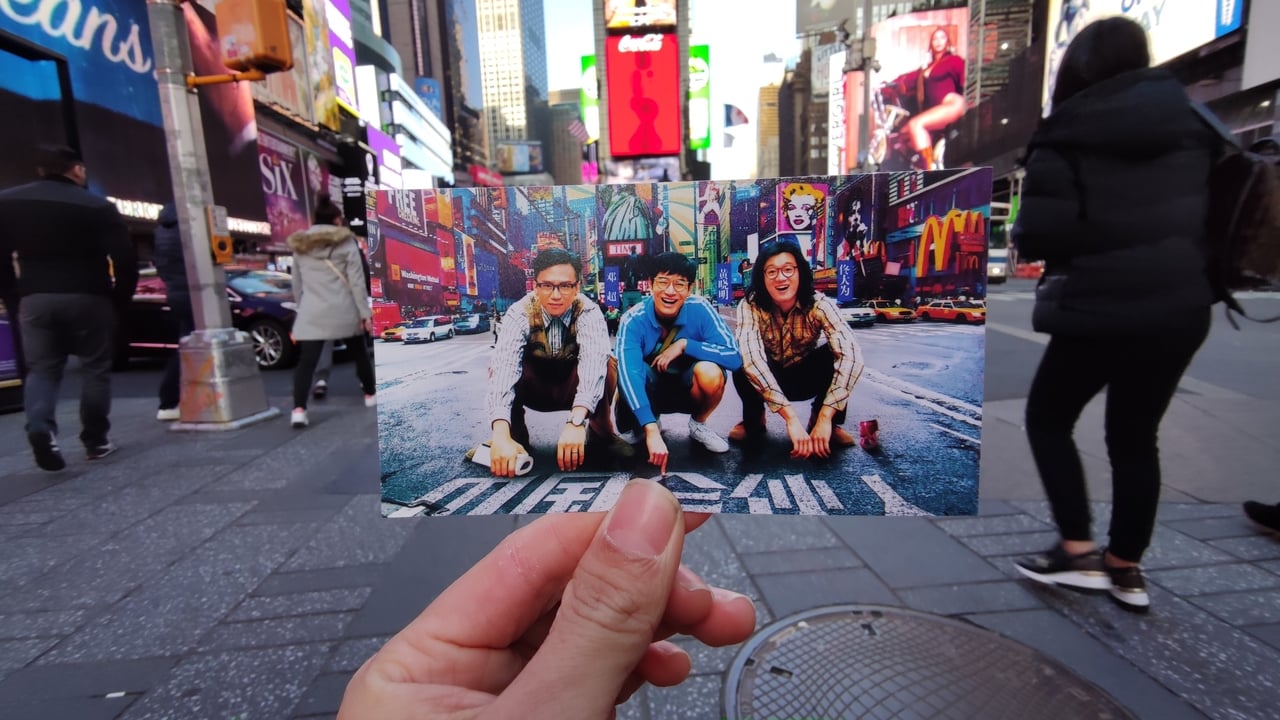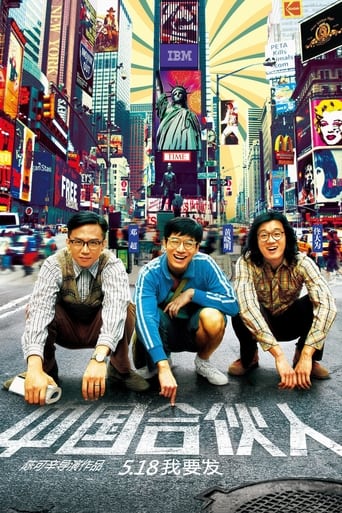LouHomey
From my favorite movies..
SteinMo
What a freaking movie. So many twists and turns. Absolutely intense from start to finish.
Micah Lloyd
Excellent characters with emotional depth. My wife, daughter and granddaughter all enjoyed it...and me, too! Very good movie! You won't be disappointed.
Juana
what a terribly boring film. I'm sorry but this is absolutely not deserving of best picture and will be forgotten quickly. Entertaining and engaging cinema? No. Nothing performances with flat faces and mistaking silence for subtlety.
Raven-1969
A person is bound to act strangely when losing at love and life. Some channel the failure into better things. In a true story, three entrepreneurs take some lumps from classrooms, random grouches, consulates, love, and each other, and manage to turn things around. They come up from depths of despair with jewels found in their hearts. With straight talk, humor and personal stories, these three turn English language classes in an abandoned factory, along with broken dreams, into a billion dollar empire. While ripe with awkward moments, inadequately developed themes, and scenes that are difficult to translate, this is a compelling tale, finely portrayed, of dealing with adversity, following your bliss and hidden talents, and letting the rest go. Seen at the 2014 Miami International Film Festival.
zheq liu
I thought Chan Ho-sun's latest movie, American Dreams in China, would be a more masculine version of Zhao Wei's So Young. But not quite, as it turns out.Although the film depicts a nostalgic campus life full of idealism for the future and the impulses of love, the story is more about starting out after innocent youth has faded.Through the intertwined destinies of the movie's protagonists, the audience witnesses a triangle of friendship, career ambitions and personal dreams seemingly collapse as three best friends desperately try to tie and twist these elements together.That's why Wang Yang (Tong Dawei), one of the three best friends, who start a business together, shares this lesson of life: "Never start a business with your best friends."He may be right. After all, no matter how close they are, differences in their professional and personal aspirations can drive friends apart. Every individual has a distinct outlook on the world and their future, which determines the trajectory of their career and life.Without knowing of Meng Xiaojun's (Deng Chao) struggles in the US and his disillusion toward the country, there's no way Cheng Dongqing (Huang Xiaoming) can understand why Meng is pushing all the agendas so hard. The parting of the invincible trio, to some extent, is predestined.Even so, despite these differences, friendship always prevails. Cheng's difficulties become a podium on which the three friends stand together. It's through the emotional connection they developed over many years that they finally overcome their differences and reform the alliance.What the film tries to convey is the triumph of brotherhood, which dates back to our naive, passionate youth when unconditional bonds of emotion are shaped.So the film was never about business after all.
moviexclusive
Never has there quite been a film which has so pointedly addressed China's complex love affair with the West as Peter Chan's latest work 'American Dreams in China', a presciently timed movie given the country's rising power on the international stage. Tapping into the contemporary Zeitgeist of the Chinese pursuit of the American dream, it sees Chan revisiting his familiar themes of love and friendship as he charts the ups and downs of three college friends over three decades who build a business empire on an English-language school.Beginning with the end, Chan introduces us to his protagonists - Cheng Dongqing (Huang Xiaoming), Meng Xiaojun (Deng Chao) and Wang Yang (Tong Dawei) - as they are called to New York to answer allegations by the United States' Educational Testing System (ETS) that they had been using ETS material within their school curriculum without permission. Because this isn't a whodunit, there isn't any doubt that the allegations are indeed true; what remains to be seen however is how they got from chasing the American dream to selling others the pathway to make that dream a reality.That story takes us back to their university days in the early 1980s during the era of the Economic Reform. Whereas Dongqing is a quiet and bookish country boy, his mates couldn't be more different - Xiaojun, the de facto leader of the trio, is ambitious and self-confident, while Wang Yang is carefree and hedonistic. Yet all three are united in a common desire of going to America, a land perceived to be one of equal opportunities that rewards the hardworking; nonetheless, they will soon discover that passion alone ain't enough - even after several rounds of interviews, only Xiaojun gets the student visa each one of them wants, leaving Dongqing and Wang Yang behind as he alone gets to live out their collective dreams. Herein is where irony sets in. Still dejected from not being able to go to the United States, Dongqing instead takes up a job as an English teacher - but a not so good one at that at least at the start. With Wang Yang's financial help though, he taps on his own thirst for making that journey to America to become a stirring motivator for countless others like him, thereby turning a hole-in-the-wall teaching establishment named New Dream into a profit-making enterprise. On the other hand, Xiaojun isn't having such a good time in America, his seemingly bright and perfect future crashing down when he is sacked from his laboratory job and forced to work as a waiter at a restaurant under a bigoted Caucasian boss. All that is packed into the first hour of the film, which uses frequent monologues and voiceovers to provide the narrative continuity necessary for such a sprawling tale. Yet even though the characters are defined well enough, their joys, disappointments and frustrations rarely stick, primarily because Zhou Zhiyong and Zhang Ji's screenplay (based upon Aubrey Lam's draft) doesn't give Chan much breathing space in between the individual ups and downs to dwell on quieter character moments. And so, though we get Chan's intention of painting a cautionary tale on ambition, idealism and reality, it ultimately rings a little too hollow, coming off more superficial than poignant.Thankfully, the movie finds a surer dramatic footing in its second half as Xiaojun heads back to China to join his buddies to bring New Dream to greater heights. Illustrating how business interests can sometimes ruin the firmest of friendships, Chan patiently observes Dongqing and Xiaojun's conflicting goals for the company, exemplified particularly in the latter's insistence of - and the former's resistance against - an IPO launch on the New York Stock Exchange. At its most effective, Chan's story is a coming-of-age tale of three friends whose bond is tested by power, money and ambition - though it does take a longer time than it could have to reward audiences with an emotional payoff.It is also for this reason that despite Chan's attempt to emulate the success of his 'Comrades, Almost A Love Story' - right down to framing the tale against memorable events in China's history such as the first KFC in 1992 and the bombing of the Chinese embassy in Belgrade in 1999 - this supposed true story of the Beijing New Oriental School isn't quite as accomplished. There's also no denying the political subtext of the film, expressed in no unclear terms by Dongqing in a didactic speech that in a nutshell demands that the West pay more respect to China and its people - in the hands of a lesser filmmaker, we might have excused it as ineptitude; but in Chan's case, one can only conclude the heavy- handedness comes from a deliberate attempt to pander to Mainland audiences.Still, to give credit where that's due, Chan does get career-best performances from his Mainland stars. Made to downplay his good looks, Huang Xiaoming puts aside his swagger and is nicely understated as the shy Dongqing who comes into his own as a firm and resolute personality along the course of the film. Deng Chao projects just the right amount of poise without becoming supercilious, and surprisingly emerges as the most empathetic of the lot especially as his self-confidence takes a beating. Though he gets slightly less attention than Huang and Deng, Tong Dawei is also extremely likable as the most good-natured of the three.In them and their characters is probably where Chan also sees himself. It's no secret that Chan now has his eyes firmly on the China market, but Chan's strengths as a filmmaker still triumph over his newfound commercial sensibilities, and even if this latest isn't as compelling as it could have been, it is at least never less than engaging.
Crveni Krst
Lately, a certain term began to sound very popular around China~ Chinese Dream. As government officials try to explain in their well prepared and yet very dull PR speeches, it's pretty much the same concept as the American Dream back in the 1950s~ work, money, happiness and national pride. However, "American Dreams in China" does not bother with this issue directly. It is only due to strange translation that one may get such an impression. Actually, the literal transliteration would sound something like "Chinese Partner". And indeed, the story is a mix of comedy and drama which revolves about the dreams and careers of 3 good friends, who came to be successful businessmen. You could say that "American Dreams in China" has elements of a Hollywood style rags-to-riches plot, but there's more to it~ For one to understand and like this motion title, one must comprehend what China looked like 30 years a go, and trust me, it had absolutely nothing to do with anything you have today. Back in the early 1980s when the story begins, Chinese society was still a firmly Maoist environment, with little or no personal freedoms. The country only started to open up, but still, the road ahead was long and challenging. Money or any kind of major material possessions were a distant dream for most. Young people had only but two choices~ to study and hope for a city desk job, or settle in the country side and employ in a field or factory. Naturally, many had a problem with the options, which pushed to them find luck in other places of the world, most often in the USA. Some of them succeeded to cross the ocean, but most had to stay in China and search for a different way."American Dreams in China" is a story about 3 college friends with same dreams, and yet, paths that took very different turns. It is a drama (based on a true story as they say) with comic elements~ A Chinese tale which in a humorous, and yet very bold ways speaks of a generation that started the business story which, up till today, made China the economic center of the world. Their work and effort will go along with the changing society, enduring the wild and turbulent tides.So, did I like it? Quite so much~ I even saw the film in a Chinese cinema with no subtitles, which was a unique opportunity for me to polish my Mandarin, haha. "American Dreams in China" is a good and creative substance for all those who like drama, comedy and are willing to get into the social issues of China. Definitely worth watching~

